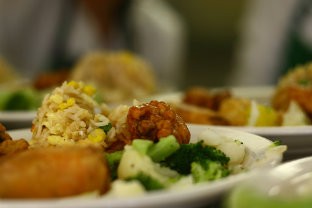Feeding and being fed: A feast for those at the edges
As a street chaplain in Marin County, California, I join with the street community in San Rafael, California, every Tuesday. Our Wellness Group is made up of people who live in their cars, people who sleep in bushes and those who are newly housed. Some drink before noon, some are in recovery. We are joined by mental health consumers, retired clergy, lay monastics—and whoever else is moved to join us. In less than an hour we move together through the ritual we’ve built over the last ten years: we sit in silence, pray and discuss sacred and secular texts. Recently, we have concluded the time with a meal organized by members of our community.
Tuesday mornings I meet with Randy, Gary and Jay—cooks who happen to be homeless—and we plan the dinner. We scavenge most of the food from local service organizations and the St. Vincent DePaul Free Dining Room, and we have a modest budget for other ingredients.
Initially we planned only simple meals—bread and soup, salad and pasta. But the cooks were delighted with the host church’s commercial kitchen and could not contain their enthusiasm. Spaghetti and meatballs led to pulled pork which led to coconut curry. Our simple dinners had turned into elaborate feasts. In the process we discovered another dimension of our practice: we were learning how to serve and feed one another—and learning how our service to others feeds us. Every week in the kitchen we ask each other, “How can we do this more?”






